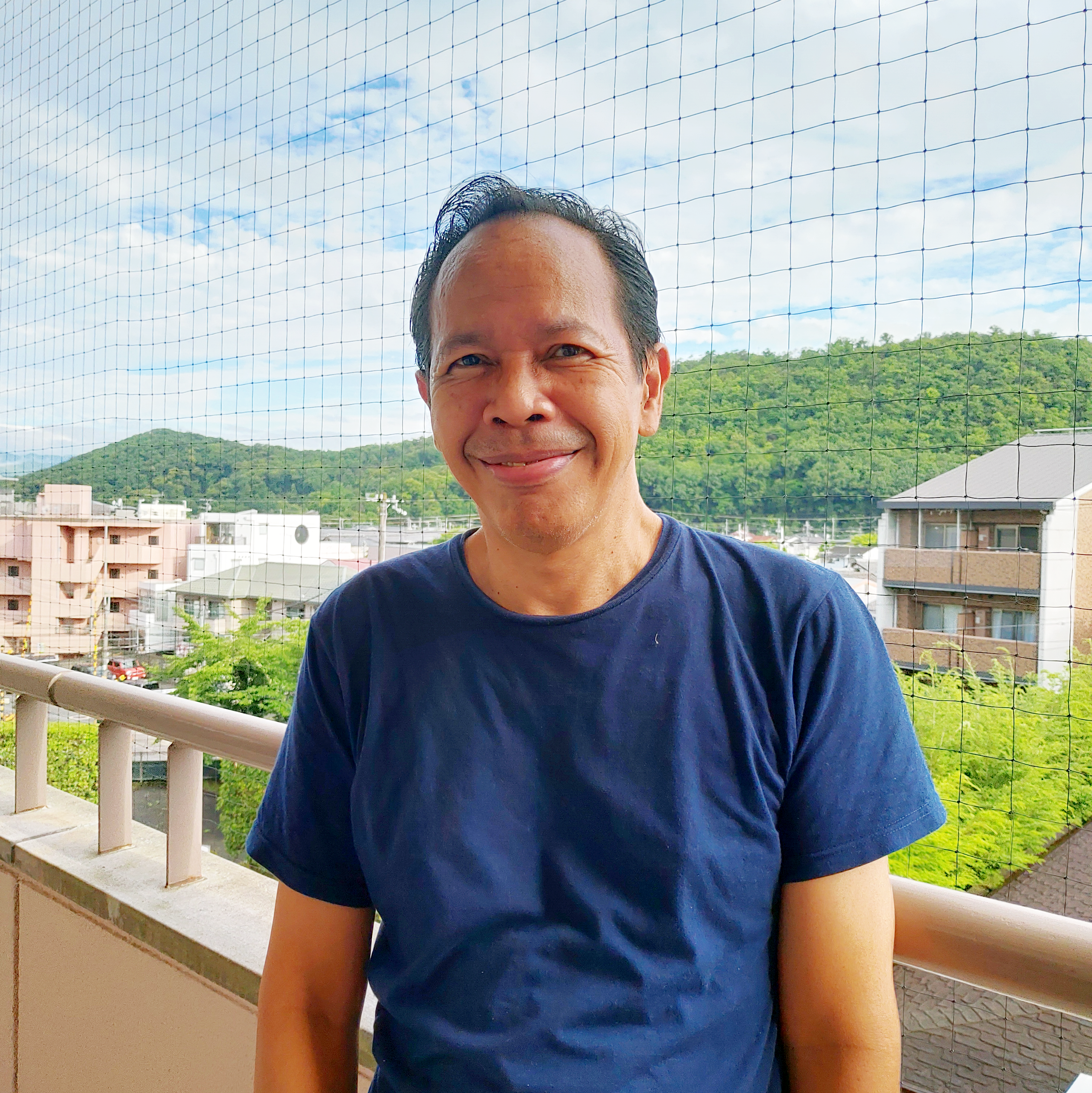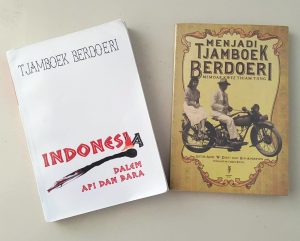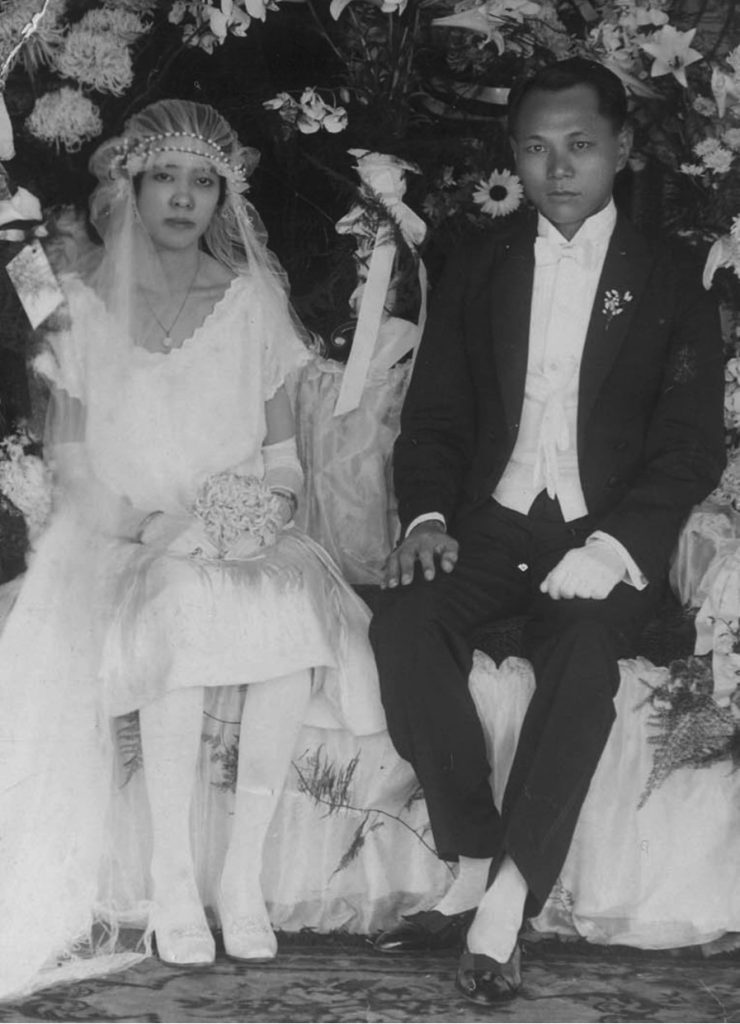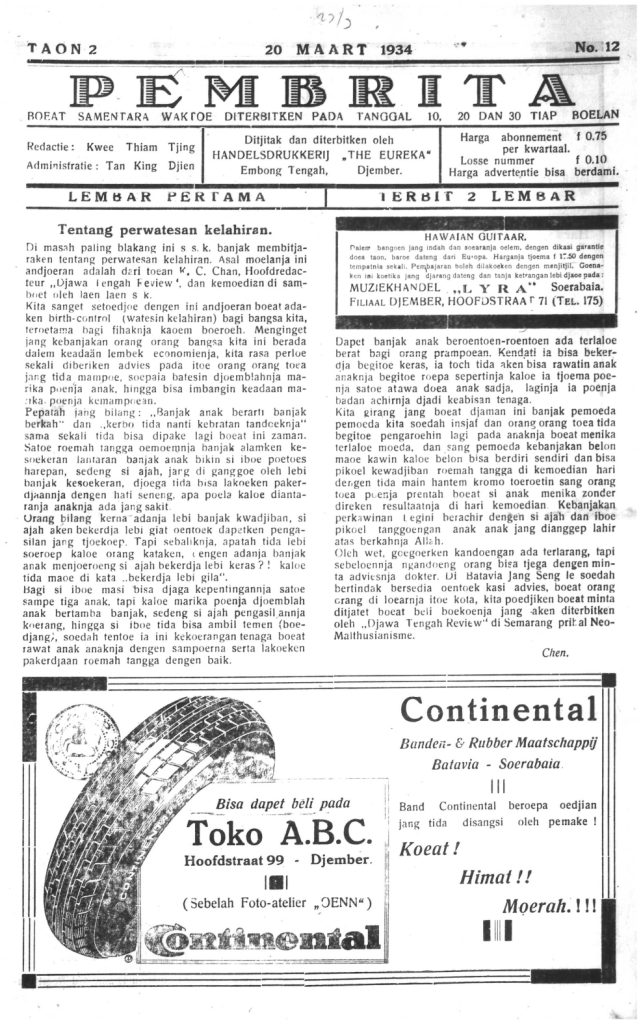Arief W. Djati
VISITOR’S VOICE
Interview with Arief W. Djati
The AREK Foundation
Uncovering a Colonial Cosmopolitan: A biography of Kwee Thiam Tjing
Please tell us about your research.
First let me explain that I am not an academic or a scholar. As a Non-Governmental Organization activist, some people call me a public intellectual. I conduct research, but my research is not as rigorous as an academic’s. Currently, I am working on the intellectual biography of an Indonesian-Chinese writer during the Dutch East Indies period. His real name is Kwee Thiam Tjing (1900-1974), but he often used Tjamboek Berdoeri (Thorned Whip) as his favorite pseudonym. This was a reminder to (Chinese) readers of the terrible weapon of antiquity to punish bad people. As far as I know, he used more than a dozen pseudonyms during his career as a journalist cum columnist to avoid the censorship of the colonial government.[1]
How many research themes do you have?
I examine several groups in my research, namely, laborers, survivors of the PKI (Partai Komunis Indonesia, or Indonesian Communist Party), political prisoners, and Chinese. These groups together can be included in the framework of the subaltern group, as they were suppressed during Indonesia’s New Order period and continue to be today. Laborers and Peranakan Chinese can be seen from the theme of class and identity. Ethnic Chinese in Indonesia are mostly entrepreneurs, and as in the colonial context, are defined in economic terms as “economic animals,” especially those wealthy groups. Those who are not very rich face numerous troubles in daily life.
Why do you find your research topic interesting?
The theme of Tjamboek Berdoeri is becoming more and more interesting to me for several reasons. First, this research focuses only on newspapers and archives in the library (and if possible, interviews). This is something that is challenging for me—to learn a new thing such as systematically reading and understanding archives, which are slightly different from the materials in a general library. Second, this author employs many tricks to mislead his readers. For example, his pseudonyms. When he was a bachelor, he used the pseudonym Hudjin Tjamboek Berdoeri, or “Mrs. Tjamboek Berdoeri”[2] to pen several articles. A few years ago, a doctoral candidate from an American university who was interested in Hudjin Tjamboek Berdoeri’s work wrote a research proposal about “her.” The candidate cancelled the proposal after I explained that the works by Hudjin Tjamboek Berdoeri were written by Kwee Thiam Tjing himself, not his wife, and I pointed out several articles that demonstrated the candidate’s claim as baseless. The third thing that makes my research interesting is being able to conduct interviews with several elderly Chinese people in Malang and Semarang who were friends and neighbors of Kwee Thiam Tjing. It is a great exercise and opportunity for me because I can interview people who are around 90 years old, and I need to be patient to listen to their stories.
How did you get started in your research and how did you come to focus on your current research?
Actually, this research was a topic of the late Ben Anderson’s research. He wanted to write a biography of the author and I helped him to edit and publish two of Tjamboek Berdoeri’s works in Indonesian.[3] After Ben Anderson suddenly passed away, I felt that I had to continue the research as he had requested before. Moreover, we had already collected quite a number of materials. So there I was, on and off, trying to work on and on, deepening and expanding my knowledge of this writer’s life journey. And it turned out that the more I delved into it, the more I felt that there were many parts of this person’s life and relationships that were extremely interesting and it would be useful if we saw and interpreted their history not just to understand the past, but also as a perspective on the future.
Have you had any difficulties in putting together the results of your research into a research paper or book?
There is always a problem putting it together because there is so much material and we want to include everything. We want it to be perfect, detailed, and complete. Putting it all together takes its own time and readiness—it cannot be rushed. Knowing this, I first write a draft, once or twice, and then I re-read it, proofread it, and then perfect it.
Can you share with us an episode about any influential people, things, and places you have encountered whilst doing your research?
A few people have been influential in my research journey and given me a comprehensive overview. Of course, the first is the late Benedict Anderson, who brought me this far by giving me many opportunities to write about this topic and helping me greatly to systematize my writings. The second person is James Siegel, who taught me to always think critically and not to be afraid to look for answers. Unfortunately, my ability and limited horizon of thought cannot fully follow his thoughts and explanations. The third person is the late Mr. Sartono (pseudonym). He is a survivor of the 1965 tragedy, which, as you know, is when Soeharto’s New Order killed almost one million Indonesian communist party members and sympathizers and detained more than one million others.[4] Although Mr. Sartono never joined or was affiliated with the PKI, he was arrested, and after being detained on Buru Island for about 10 years, he had to start his life again from scratch. I was amazed and impressed by his willingness to learn, his courage, and his fortitude. My interview with him was popularly written up in a chapter in the book Menembus Tirai Asap: Kesaksian Tahanan Politik 1965 (2003).[5]
Which books or people have influenced you?
Two books in particular have had an impact on me because they inspired me to confront everyday problems with the ideas that they put forward. The first is The Pedagogy of the Oppressed (1980)[6] by Paulo Freire (1921-1997), a Brazilian educator. It was translated into Indonesian in 1984, and I only read the book around 1988. The Indonesian translation was awful, but fortunately for me, I had a friend who had the English edition, so that is what I read. The book seemed to guide me to help the weak and the suppressed to voice their concerns and to encourage them to overcome their daily problems. The second book was Madilog (1943) written by Tan Malaka (1897-1949),[7] one of the leaders of the Indonesian independence struggle before Soekarno and Hatta. Madilog means Materialism, Dialectic and Logic and the title is intended to invite readers to be more critical and not to believe in superstitions. Remarkably, the book was written underground when Japan occupied Indonesia. Tan Malaka wrote the book based only on his memories and notes because he had no access to existing books. I read it when the book was banned by Indonesian’s New Order Government in the 1980s.
What is your ideal image of a researcher?
A researcher should, in my view, not only write down and report what is found in the research field, but also, as far as they can, help the people and improve the situations they encounter. For this reason, researchers must be able to write honestly and openly about what they find. And, then, as a human being, they should try to help others where they can. Maybe this ideal is different from the imagination of scholars or academics generally.
What is your must-have gear for field research and writing?
I think tools are just tools. They are not a must-have. When it comes to must-haves, then some important things are patience, perseverance, and hard work. Patience, because the researcher sometimes must listen to interviewees talk about issues that they do not appreciate or may think are irrelevant, but also perseverance and hard work when working in the field. If these are in place, then the tools can be discussed. Actually, I only use the Endnotes app occasionally when writing; for transcribing, which is sometimes tiring. I sometimes use a live transcribing app. However, the transcription is not accurate, especially if it is not in English, and it has to be checked and edited again. Also, I use my mobile phone to capture ideas with some note-taking app, and sometimes I use paper to back it up. For reading journals and articles, I mostly use my e-book reader.
What books can you recommend to a younger people?
I cannot mention this or that title. If I must make a suggestion, I suggest them to read any book that they like. Everything. It is also important to always take the time to read literary works to train your style and sensitivity in analyzing problems/situations.
What would you say to people who want to become researchers?
Maybe before beginning research, you should first ask yourself whether you are really enthusiastic about this field of work. If the answer is “yes,” then do it wholeheartedly and to the best of your ability. Practice writing and listening to other people’s thoughts while reading more.
What ambitions do you have for the future?
Working on the biography of this person has encouraged me to read more and expand my knowledge. Therefore, after the biography is completed, I want to expand this research and supplement it with writing about his close circle from the Sin Tit Po newspaper, which included members from various ethnicities and, later, political orientations. They were: Kwee Thiam Tjing himself, from PTI (Partai Tionghoa Indonesia, or the Indonesian Chinese Party) but non-partisan, Liem Koen Hian (1897-1951), from PTI and Gerindo (Gerakan Rakyat Indonesia, or the Indonesian People’s Movement), A.R. Baswedan (1908-1986), from PAI (Partai Arab Indonesia, or the Indonesian Arab Party) and a Parliament member (a Junior Minister), Tjoa Tjie Liang alias Anang Satyawardaya (1913-2006), from PTI and later Golkar (Golongan Karya, or the Functional Party), and D.J. Syranamual (1900-1956), from Serikat Ambon and a Parliament member. In contrast to Furnivall’s classic thesis on plural society, that various ethnicities meet each other only in the marketplace, the Sin Tit Po circle illustrates that people worked together in various spheres of colonial life and in the broader contexts of, among other things, nationalism and cosmopolitanism.
(July 2022)
Notes
[1] His prolific use of pseudonyms reminds us of the great Portuguese author Fernando Pessoa (1888-1935), a contemporary of Kwee Thiam Tjing, who also used many pseudonyms. See Richard Zenith, Pessoa: A Biography, Liveright Pub Corp, 2021.
[2] “Hudjin” from “Hudjin Tjamboek Berdoeri” comes from a Hokkien word, and it means “Nyonya” in Indonesian or “Mrs.” in English. Kwee Thiam Tjing used this pseudonym many times before he married Nie Hiang Nio in 1928.
[3] Tjamboek Berdoeri, Indonesia Dalem Api dan Bara [Indonesia in Flames and Embers] (Jakarta: Elkasa, 2004, 2nd ed.) and Kwee Thiam Tjing (Author), Arief W. Djati and Ben Anderson (Eds.), James Siegel (Pref.), Menjadi Tjamboek Berdoeri [Being Tjamboek Berdoeri] (Jakarta: Komunitas Bambu, 2010). The former is the only book published while Kwee Thiam Tjing was still alive, and the first edition was published in Malang in 1947. The latter is a collection of his daily columns that were written in the Jakarta newspaper Indonesia Raya in the 1970s.
[4] See Robert Cribb (Ed.), The Indonesian Killings of 1965-1966: Studies from Java and Bali, Clayton, Victoria, Australia: Monash University Centre of Southeast Asian Studies, 1990.
[5] See Mr. Sartono’s testimony in H.D. Sasongko dan Melani Budianta (Eds.), Menembus Tirai Asap: Kesaksian Tahanan Politik 1965 [Passing Through the Dark Shadows, testimonies of political prisoners 1965], Jakarta: Yayasan Lontar dan Yayasan Budaya Indonesia, 2003.
[6] Indonesian translation of Paulo Freire’s book, Pendidikan Kaum Tertindas, Jakarta: LP3ES, 1984.
[7] On Tan Malaka, see Harry Poeze, Tan Malaka: Strijder voor Indonesie’s Vrijheid Levesloop van 1897 tot 1945 [Tan Malaka, Struggle toward Indonesian Independence 1897-1945] (The Hague: Martinus Nijhoff, 1976) and Tan Malaka’s own book, Madilog (Jakarta: Terbitan Wijaya, 1951).
Arief W. Djati is a Visiting Research Scholar of CSEAS
from June – August 2022



